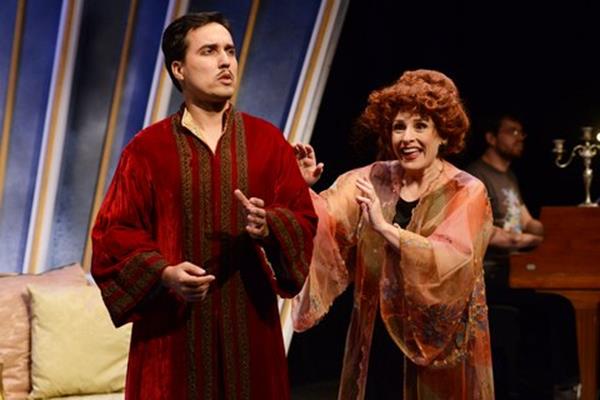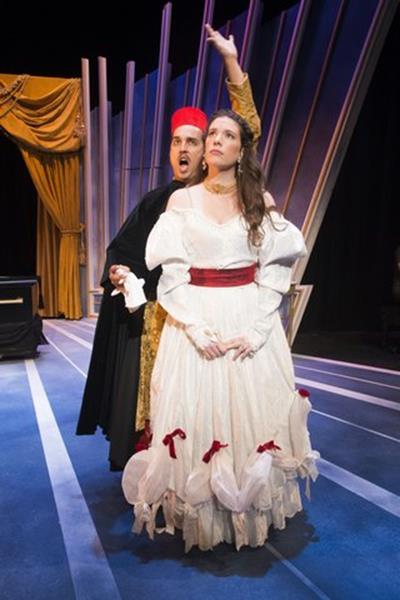A Wake and a Wedding
Encompass New Opera Theatre's fine and spirited mounting of a modestly amusing work.

Eapen Leubner and Joy Hermalyn in a scene from “A Wake or a Wedding” (Photo credit: Monica Simoes)
The story is set in 1898 Butte, Montana. On the eve of his daughter’s wedding, the patriarch of a wealthy family has died. The daughter, Velena-Sue Davenport (Caroline Bassett Miller) wants the wedding, and not the wake. Her fiancé, lepidopterist Jack Highstraw (Scott Lindroth), isn’t so sure, and her mother Deirdre (Alison Davy) lost her mind decades ago. The servants, honest Smelt (Adrian Rosas), dewy Ambrosia (Marie Anello), and larcenous Miss O’Dell (Lindsay Rider) each have their own agendas. Then, as catalyst, the wedding entertainment arrives in the form of operatic vaudevillians Marcella Sorella (Joy Hermalyn) and Raimondo Vecchiofaraone (Eapen Leubner) who insist on sticking around even if the wedding is in doubt.
This exposition is followed by a brief pile up of complications, proceeded by the aforementioned parade of revelations (mostly concerning parental misattribution).
Under music director Mara Waldman, the vocalists were very well prepared, and always projected confidence. Director Rhodes got the comedy to land consistently (never a given with opera), and the ensemble in general communicated an infectious enthusiasm; I would recommend them to any composer working in this genre. Thomas’ vocal writing was neither cruelly taxing nor monotonous, and the words were clearer than usual, for which credit needs go to both vocalists and composer.
As for how this actually played, while any given half-hour was entertaining, the structure of the story was ungainly. The series of comically outlandish revelations begins a little more than halfway through, and although there is a bit of humor in the sheer excess of every person seeming to have a secret identity or progeny, the individual ‘reveals’ weren’t necessarily amusing, and the characters are too paper-thin for us to find the reversals of fortune compelling (though Lindroth and Anello managed better than those in the more broadly comic parts). The satire quickly becomes repetitious, and spending a third of the evening on the denouement is seldom recommended.

Eapen Leubner and Caroline Bassett Miller in a scene from “A Wake and a Wedding” (Photo credit: Monica Simoes)
The orchestration is disappointingly bland, a missed opportunity. One of the delights of scoring for a large ensemble is that you can use subgroups: a number with just winds, or piano trio, or just low or high instruments, and so forth. That sort of thinking was scarcely in evidence here.
Stephen H. Carmody’s forced-perspective set made good use of the limited space. Conductor Waldman led the twelve-piece orchestra Ionization New Music Group (string quintet, woodwind quintet, piano, and percussion) with confidence and security. The orchestra was both obviously capable and obviously under-rehearsed, and had some rough moments; these probably fixed themselves after a few nights, but an extra rehearsal would have been a very good idea. (Probably true of every premiere ever, of course.)
The venue is problematic, as there is simply no good place to put an orchestra in a black box theater. (Here they took up half the potential playing area stage left). The most common solution is to a build high platform behind the playing area, but that’s impractical for a short run like this one. If Encompass is going to be resident at Baruch, they might consider it.
A Wake or a Wedding (November 6 – 16, 2014)
Encompass New Opera Theatre
Baruch Performing Arts Center, 55 Lexington Avenue, at 25th Street, in Manhattan
For tickets, call 718-398-4675 or visit http://www.OvationTix.com
Running time: one hour and 40 minutes with no intermission.






Leave a comment